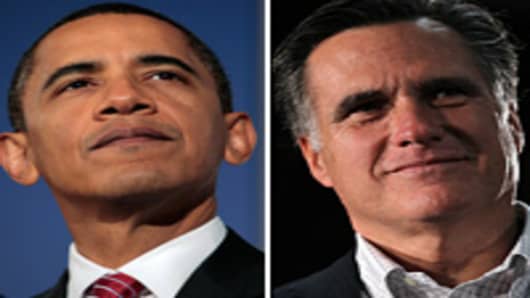But when asked who they would want to invest their money, Romney gets the job by a margin of 42 percent to 24 percent, with 28 percent saying neither.
Hart Pollster Jay Campbell said the Obama camp will view the poll results with concern because of Americans’ downbeat views on the economy, even in categories that have demonstrably improved.
For example, only 34 percent of Americans said the value of their stock market investments is better off than it was four years ago, with 29 percent saying worse and 28 percent saying it’s about the same. In reality, the benchmark S&P 500 stock index is up 80 percent since Obama took office.
But Campbell said the Romney campaign will be concerned that it is lagging on the economic issue despite widespread discontent.
Just 10 percent say the economy is "good" or "excellent." Ninety-one percent call it only "fair" or "poor," with 53 percent using the "poor" label.
Just 35 percent said they expect the economy to improve, while 23 percent said it will stay about the same, and 25 percent expect it to get worse. A large percentage, 17 percent, said they are unsure about the direction of the economy.
“The point that would make me nervous if I were Romney is, given all that downbeat negative data, I, as a candidate, should be up substantially. I have the business background. But I’m not seeing all that translate into people thinking I can do better and it’s not translating into an advantage in the ballot box,” Campbell said.
Both the assessment of the current state of the economy and the outlook are little changed from our prior survey in June, although they show a slightly brighter outlook than during 2011.
One bright spot for the economy is housing, with 27 percent of Americans believing the value of homes will increase in the next year. That's the highest percentage since 2007 and the third quarter in a row that more Americans are looking for home price increases compared with losses. However, they see only a modest 0.5 percent price increase over the next year.
At the same time, Americans are concerned about inflation, believing that prices will rise 4.4 percent over the next year, up from 4 percent in CNBC’s June survey. However, they believe their wages will rise only 2.3 percent over the next 12 months.
On the stock market, just a third of the public believe it’s a good time to invest, compared with 48 percent who say it’s a bad time. The results are little changed from June.
Technical note: The CNBC All America Economic Survey is a comprehensive quarterly survey conducted for the past five years aimed principally at gauging Americans’ views on economic and financial issues. It has always been a survey of all adults, and not of registered or likely voters. As a result, its results may not be comparable with other political surveys.



